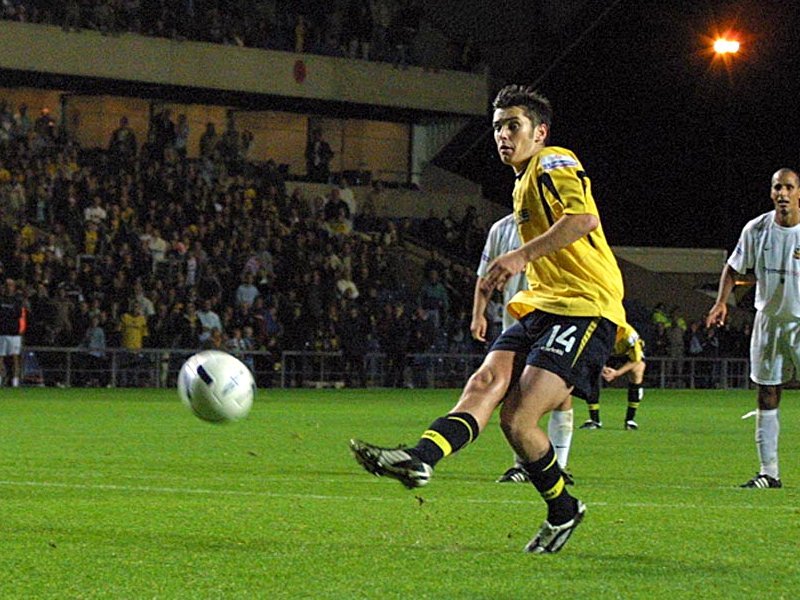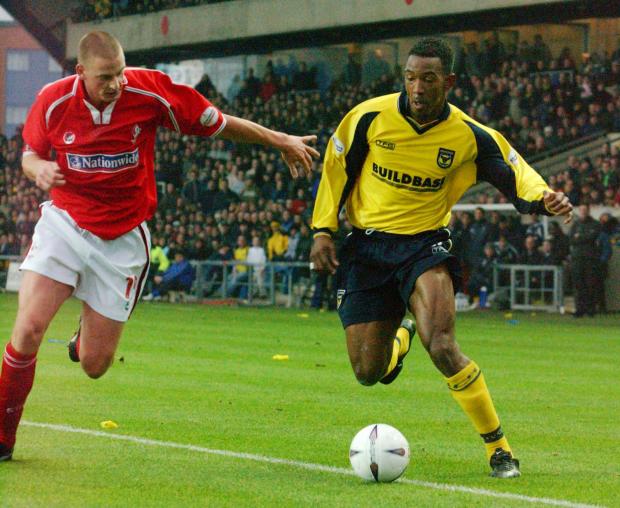
Runners and riders
From Mark Wright to Rob Dickie, Oxford United have a rich history when it comes to central defenders. They are towering oaks, immovable, reliable bedrocks of any success. For me, your central defensive partnership speaks volumes about where you are as a club; when they are solid, so are we, when they are flakey, so are we. We’ve had some great central defenders; so many that I couldn’t narrow the field to the normal sixteen competitors so I had to go with an epic thirty-two, even though there was a bit of chaff to make up for the abundance of wheat.
The tournament wasn’t without its controversy. I’m meticulous in trying to be fair, but the first draw I did put a group together which included Gary Briggs, Malcolm Shotton, Matt Elliot and Phil Gilchrist. I decided to do the draw again.
The tournament was then thrown into crisis when it was pointed out that Canadian international Mark Watson had been omitted from the thirty-two. Watson was a steadying influence at the turn of the millennium and worthy of inclusion. My bad. Following a dead heat in a vote as to whether he should be included from the second round, one tweet in support decided it.
From there, battle commenced.
Group A
Even in the second draw it wasn’t possible to separate Gary Briggs and Phil Gilchrist who together comfortably took over 80% of the vote. In their wake was Darren Purse, a very capable back up to Elliott and Gilchrist in the 90s. Purse had all the attributes to stand alongside the greats, but largely lived in the shadows of those two before moving onto better things. Phil Whelan never stood a chance and would probably be happy with his five votes
Group B
Group B was a bloodbath, Malcolm Shotton blew everyone away with 80% of the vote. Second place, a long way back, were Elliott Moore and Luke Foster who presumably picked up their votes from people for whom Shotton is just a grainy video clip on YouTube. In the end, there was just two votes in it with Moore prevailing. Phil Bolland was left bewildered, picking up two votes.
Group C
Group C seemed more even, Steve Davis’ place in the team was a signal of the club collapsing in the late 90s, but the others were all well regarded in their time. There’s a lot of respect for John Mousinho, so he came out on top with 58.2% of the vote, followed by the most educated of all the competitors Kiwi Ceri Evans (MBChB MA MSc Dip ForMH MRCPsych PhD). Michael Raynes won a lot of friends during his time at the club but couldn’t compete.
Group D
Similarly Group D looked an even fight. Tommy Caton played in Division 1 for the club, but his time at the club is mostly forgotten. Mark Creighton’s time at Oxford was relatively short, but his impact was immense meaning he came out on top with 48.6% of the vote. He was followed by Andy Crosby, a John Mousinho-type commanding defender from the early 2000s. Michael Duberry had a lot of fans during his two years with the club, but couldn’t quite live with the big guns in the group.
Group E
Curtis Nelson laid waste to Group E picking up the same landslide victory as Malcolm Shotton in Group B with 83.4% of the vote. The rest were fighting for scraps, it was Brian Wilsterman, the hapless, accident prone, but charismatic Dutchman who picked up just 9.6% of the votes to ease into the second round.
Group F
Group F was all about the younger pretenders. Both Andy Melville and Steve Foster were club captains and internationals – Foster played in the 1982 World Cup. But, with Twitter skewed towards a slightly younger demographic and the fact that football fans tend to have short memories, Rob Dickie and Chey Dunkley took the honours.
Group G
Had only the winner gone through from Group G, then it would have been a group of death with the presence of Matt Elliott and Jake Wright together. In the end their combined forces blew away makeweights Rhys Day and Charlie Raglan. Elliott prevailed with 59.6% of the vote. Day was the only player in the competition not to pick up a single vote, which is a shame given his contribution to Alfie Potter’s goal at Wembley in 2010.
Group H
An epic group stage concluded with a fairly convincing sweep from Johnny Mullins and Mark Wright. Wright was probably the best defender in the competition he went on to play a pivotal role for England in the 1990 World Cup and captained Liverpool, but his time at the club when manager tainted his image, so he ran out second to the amiable Mullins.
Round 2
As if to illustrate that these competitions are not wholly a judgement of ability, Gary Briggs blew away Mark Wright in the first game of Round 2. Rambo took 85.8% of the vote setting his stall out for the rest of the tournament. On the pitch and in Twitter polls, he wasn’t going to take any prisoners.
A battle of the hardest of hard men. I’d have paid good money to see Mark Creighton and Malcolm Shotton go up against each other on the pitch. In the end, Malcolm Shotton made it a double for The Milk Cup duo taking over 75% of the vote. Farewell dear Beast.
John Mousinho is a mightily impressive man, a great communicator and leader and a real asset to the club, but when put up against Matt Elliott, he really didn’t stand a chance. Elliott blazed past him with nearly 80% of the vote.
Game 4 was a 2016 derby, an old partnership which saw us through the late Wilder years, right up to the point where Chey Dunkley emerged as a force to be reckoned with. Head to head, though, there was no contest, Wright took it with the highest vote percentage of the tournament so far.
Then things started to unravel, a frantic thirty minutes when I had a shopping delivery and a log delivery in quick succession coincided with the conclusion of the first round and someone pointing out that I’d forgotten Mark Watson. Watson was a Canadian international and club captain in the late 1990s. While the club collapsed around him, he remained steadfast and was worthy of a place in the tournament. An emergency poll as to his inclusion came out 50:50, so in the end, one supportive tweet decided it. It didn’t do much good, Phil Gilchrist won comfortably with 66.9% of the vote, Watson’s inclusions simply seemed to split the vote with Andy Crosby.
After that drama, we all needed a bit of knockabout fun, so watching Brian Wilsterman get schooled by Chey Dunkley was just what the doctor ordered. Dunkley broke the record with 95.6% of the vote, with people admitting that they voted for Wilsterman out of sympathy.
But if Chey Dunkley’s win was convincing, Rob Dickie’s destruction of his old defensive partner Elliott Moore was devastating. Dickie humbled the big man with 97% of the vote, the biggest win advantage in this or any other tournament.
The final game was nearly as convincing; Curtis Nelson’s more recent escapades fried 90s-guy Ceri Evans who would probably be happy with a second round place. Evans can go back to his books while Nelson booked his place in the quarter-finals.
Quater-Final
The second round shed the tournament of its makeweights, all eight quarter-finalists were veterans of epic campaigns and leaders in their own right. There were no easy ties. First up, was Rob Dickie against Phil Gilchrist. It should have been close, but Dickie’s more recent escapades made him the comfortable win with 60% of the vote.
There are moments in these things where people you think of as imperious, suddenly look meek and vulnerable. Matt Elliott ominously swept aside Curtis Nelson in game two with 83.1% of the vote. Could anyone stop him?
Game three was the tightest of them all. Jake Wright lived more recently in the memory and was arguably the more refined defender, but would that be enough? The legend of Gary Briggs lives strong, the blood streaming down his face and splattered on his shirt, these evocative images gave him just enough to sneak by with 54% of the vote.
The final quarter-final was another case of a legend coming up against a more lived experience. Once again, the legend lived on with Malcolm Shotton comfortably taking 71% of the vote.
Semi-Final
The strength of myth and legend saw Malcolm Shotton prevail in the first semi-final. Rob Dickie would have to be pretty pleased to have got this far and lay a glove on the moustachioed maestro with nearly 40% of the vote.
Semi-Final 2 looked tighter on paper; Briggs is a titan of Oxford United lore, could anyone overcome him, would anyone dare? It turns out, yes and convincingly. Matt Elliott eased through with 78.6% of the vote.
Final
And so to the final and two worthy pugilists, masters of their craft, veterans of legendary campaigns. Shotton, the captain of the glory years, Elliott, the jewel in the mid-90s promotion crown. Early voting was split with the two sharing the spoils, but slowly, Elliott began to ease ahead. Just like he was on the pitch, there was a gracefulness to how he did it, by the end he’d picked up 61.8% of the votes. Following an epic and brutal contest, the two contenders fell into each others arms; Elliott the victor.
Verdict
It took nearly 4000 votes to decide it, but Matt Elliott was a more than worthy winner. We are easily impressed by the brutality of central defenders and it the debt the club has to Malcolm Shotton will never be fully repaid, but Elliott had something extra and so it proved. In truth, the Shotton/Briggs partnership was found out in the First Division and our survival relied on the goals of John Aldridge rather than the backline. Elliott, though, never looked uncomfortable whether playing for us, in the Premier League or on the international stage. Elliott was the one that made the difference in the 1990s and we were lucky to have him.







